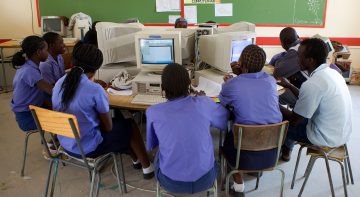News

News Release
Teen pregnancy in Kenya: Verifying the data and the facts
Nairobi– Recent reports of a spike in teenage pregnancies across the country during the COVID-19 pandemic lockdown have been met with shock, angst, and disbelief. Additionally, the data on prevalence circulating on various platforms has been contested and cited as being exaggerated with ulterior motives.
Given the seriousness of this matter, the African Institute for Development Policy (AFIDEP) sought to validate and compare the number of teenagers presenting with pregnancy from the Kenya Health Information Management System (KHIS) in 2020 to 2019. The data show that the number of girls, aged 10-19 years, presenting with pregnancy in January-May in 2019 and 2020 are not that different, and leaning more towards a decline in 2020. Decline in use of health facilities during the COVID 19 period and delay in validation of the latest figures in 2020 may account for lower numbers in 2020.
A quick trend analysis shows that Nairobi county is leading with 11,795 teenage pregnancies in the period Jan-May 2020. This is slightly higher than last year’s figures in the same period where there were 11,410 cases reported. Kakamega county is a close second with 6,686 cases compared to 8,109 cases last year. Machakos county, that has been the focus of the latest public outcry on teen pregnancy ranks number 14 with 3,966 cases registered this year compared to 4,710 cases last year. From all the counties, the total numbers reported for the period January-May 2020 are 151,433 compared to 175,488 for the same period in 2019. See a table summarizing the numbers for each county here.
It is important to note that the KHIS data only captures cases reported in the health sector and so it is possible that there are many other pregnant girls who are not counted because they have not been to the health centres. On the other hand, briefings from the Ministry of Health in the past week indicate that these numbers also capture multiple visits and hence are not reflective of the exact number of pregnancies. One thing we can safely conclude from the data available is that the evidence presented does not support an upsurge in teenage pregnancy because of COVID-19 school shutdown and movement restrictions.
The reality is that teenage pregnancy is high in counties across the country, and has remained so for some time now despite the periodic outcry when numbers on teenage pregnancy are released. This therefore calls for a redoubling of efforts and change intact on how to address this menace that is holding back our girls from maximizing their full potential.
The gravity of high teenage pregnancy is not new in Kenya. Data from the Demographic and Health Surveys show that almost 2 out of 10 girls between the ages of 15 and 19 are reported to be pregnant or have had a child already. This trend has been fairly consistent for more than two decades with little change in prevalence between 1993 and 2014.
Teen pregnancies are a major challenge for socioeconomic development because they deprive our young girls the opportunity to further their education and attain their career goals. It also exposes them and their children to major health risks. According to World Health Organisation, “pregnancy and childbirth complications are the leading cause of death among girls aged 15–19 years globally.”
While teenage pregnancy in Kenya is high and needs to remain at the top of the government’s political agenda, it sporadically gets into public discourse triggered by certain events, after which it gets buried and we continue with business as usual. The last time this issue headlined and drew as much public uproar was during the national examination period in 2018 with reports of several young girls pregnant or giving birth while sitting for either their Kenya Certificate of Secondary Education and Kenya Certificate of Primary Education examinations.
To turn the tide and protect our young girls from teen pregnancies, there is urgent need to address systemic drivers of teen pregnancies by fully funding and consistently implementing cost-effective programs. Cultural, religious, and socio-economic factors that contribute to this problem are multiple and layered and interventions for addressing these are well known. We need to confront hard truths and realities of the issue with honesty and openness.
Efforts to address teenage pregnancies and other sexual and reproductive health matters are resisted by parents, religious leaders, political leaders and other stakeholders despite the mounting evidence that young people are initiating sex earlier than in the past. Proven interventions like appropriate sexuality education are also often dismissed with the view that they would encourage young people to indulge in sex. In order to address this challenge decisively, it is important that evidence plays a central role in determining interventions that can stump out the problem from its root cause.
About AFIDEP
We aspire for an Africa where evidence transforms lives. AFIDEP works towards systemic actions that drive a cultural shift from low evidence use to a setting where evidence is actively sought and used routinely in decision-making so that the right investments are made towards the transformation of people’s lives for the better.
www.afidep.org ; twitter: @Afidep
Contacts: Bernard.onyango@afidep.org; elizabeth.kahurani@afidep.org
Teen-pregnancy-in-Kenya-Verifying-the-data-and-the-facts.pdf
Related Posts





